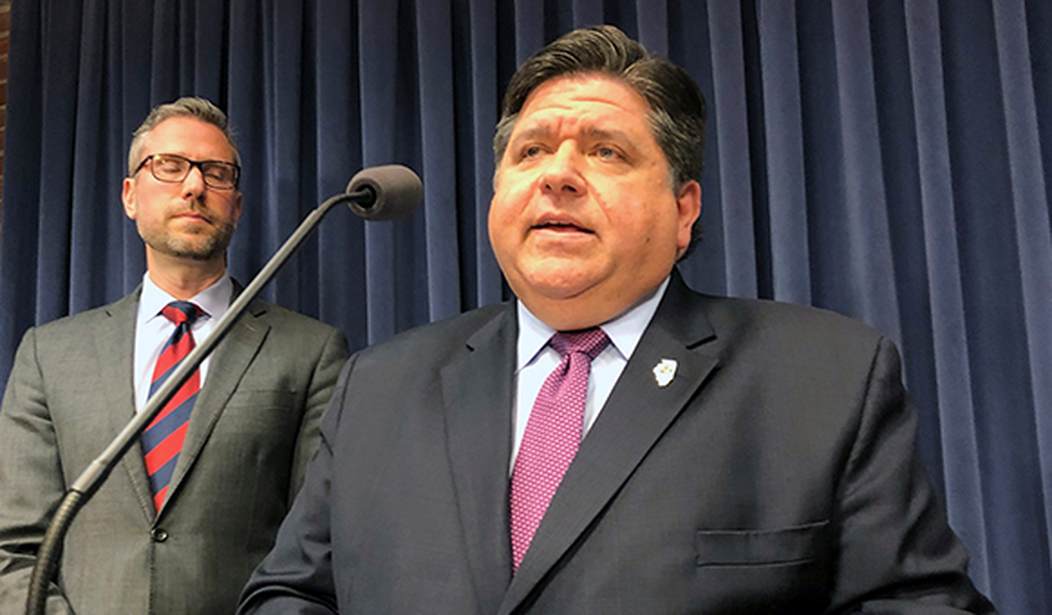Policies have consequences, especially financial incentives -- and disincentives. Texas supplies plenty of the former, while blue states such as New York, Delaware, and Illinois provide overwhelming amounts of the latter. Corporate America has taken notice of the Lone Star State's favorable tax and business environment, prompting a significant number of companies to re-incorporate and relocate to Texas.
Now the stock exchanges are following suit. Texas had already encouraged some investors to set up a competing exchange in Dallas, given the corporate relocations and the desire in the financial industry to lower their tax risks. NASDAQ and the New York Stock Exchange are now rushing to fill the gap -- at the expense of Illinois and J.B. Pritzker:
The New York Stock Exchange will reincorporate its Chicago branch in Texas, it announced on Wednesday, rebranding it as NYSE Texas and moving to Dallas.
With the upstart Texas Stock Exchange taking shape and the Nasdaq expanding its reach in the Lone Star State, the Dallas region is about to find out if “Y’all Street “ is big enough for three players.
Timing of the Big Board’s “fully electronic” Texas equity market will depend on regulatory filings, the NYSE said. The announcement comes as a number of big companies flock to Texas as a whole, drawn in by its low taxes and business-friendly regulation.
The Texodus has been coming for a while. The Wall Street Journal reported on it last summer after financial giants began installing big footprints in Big D:
Ross Perot Jr. gestured out the window as his helicopter circled a 4.5-acre pit alongside the skyline of downtown Dallas. Texas and U.S. flags hung from a crane within it.
The site is where Perot’s real-estate investment company, Hillwood, is partnering to build a $500 million Goldman Sachs GS 0.41%increase; green up pointing triangle tower for more than 5,000 bankers and investors. That will make it the financial firm’s second-largest office, behind New York. As the helicopter swung northwest, windows glinted from two unfinished Wells Fargo office towers, scheduled to open next year. A bit farther away: a fourth office building under construction for Charles Schwab, which moved its headquarters from California to the Dallas area five years ago, and the footprint of a Deloitte campus doubling in size.
The sprawling landscape illustrates an expansion that has brought to North Texas a presence in financial services that now sits second only to New York City in the U.S. And growth of so-called Y’all Street is accelerating.
How much has it been accelerating? Dallas' financial sector became the second-largest in the nation, only trailing New York City, even as other Sun Belt states -- red states -- experienced significant growth as well. Florida's financial sector grew 15% between 2019 and 2024, for instance, compared with Texas' 13% growth in the same period -- but Dallas' growth started 20 years ago. The BLS shows that Texas' financial sector grew 111% during that longer period, where New York City's growth in that sector was only 16%.
With that kind of growth and status in the financial industry, opening a satellite exchange for the NYSE and for NASDAQ makes sense. Getting into Dallas also makes sense as the Texas Stock Exchange (TXSE) will open this spring, temporarily in Weir's Plaza in Dallas while the search for a permanent base continues. But it also makes sense to flee from Chicago and Governor J.B. Pritzker's progressive tax and regulatory environment in Illinois, and perhaps even more especially the crime-ridden downtown in the Windy City.
After all, it's not just the NYSE that's bailing on Illinois. Seven counties in the state voted last November to secede and become part of Indiana:
As states grow more politically polarized, the difference between good and bad governance is coming into sharper relief for voters. Enough people are noticing in Illinois that some counties want to secede from the Land of Lincoln and join a state that isn’t ruled by public unions and their political yes-men.
In November, to little national notice, seven Illinois counties voted to consider seceding, and now Indiana is rolling out the welcome mat. Voters in Iroquois, Calhoun, Clinton, Greene, Jersey, Madison and Perry counties approved a nonbinding ballot question on cutting ties with Illinois. The votes weren’t close. Six of the seven counties approved the advisory question by more than 70%. Iroquois County’s vote was some 72%, and Calhoun County’s near 76%.
Indiana House Speaker Todd Huston says the Illinois counties would be more than welcome to come on over. On Jan. 14 the Republican introduced legislation to establish the Indiana-Illinois Boundary Adjustment Commission, which would include five members appointed by the Indiana Governor and five members appointed under Illinois law, to discuss moving the state line. “We think instead of seceding and creating a 51st state, [Illinois residents] should just join us,” Mr. Huston said.
Take a look at the economic chart provided by the WSJ editorial board last week to explain why both businesses and entire counties want out from under Pritzker's thumb. Both ALEC and Chief Executive Magazine rank Illinois 48th among states for economic outlook and business conditions. The corporate tax rate in Indiana is half that of Illinois; it's zero in Texas. The pension debt load is hitting crisis levels in Illinois. Small wonder that "33 Illinois counties have voted to consider breaking away from the state" over the past four-plus years.
Y'All Street may not put Wall Street out of business. But it seems likely to accelerate the Texodus of Chicago's financial industry ... and more.








Join the conversation as a VIP Member